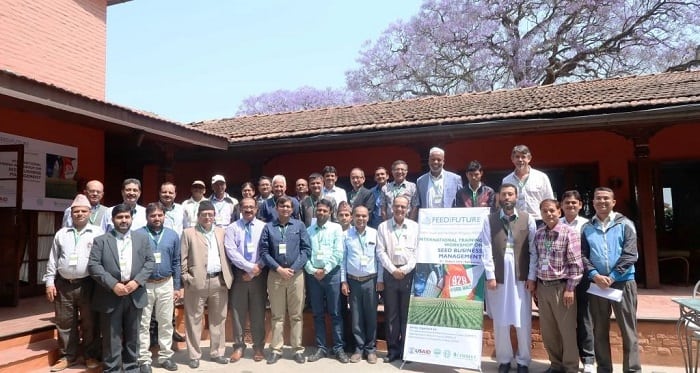Improved seed with proper management practices is an important agricultural input which can boost crop productivity by more than 50 percent. This gain is necessary to achieve food security and alleviate poverty in many developing countries. However, it can be challenging for farmers to find high-quality seeds as availability, affordability and accessibility remain hurdles to improved seed distribution. In Nepal, the majority of rural farmers use farm-saved seeds of inferior quality leading to low productivity and subsistence livelihood.
The seed industry in Nepal, as in most developing countries, is still emerging and largely untapped. Lack of availability of start-up working capital, business incentives in the sector, new technologies and required technical expertise limit the current seed value chain.
To address this, the Nepal Seed and Fertilizer (NSAF) project is engaging Nepalese seed companies in a business mentoring process to enhance their ability to test and deploy new products, develop business and marketing plans and sustain a viable, competitive seed business, particularly in hybrid seeds.
The NSAF project, in collaboration with the Nepal Agricultural Research Council (NARC) & the Seed Entrepreneurs Association of Nepal (SEAN) organized an “International Training Workshop on Seed Business Management” for senior-level seed company managers and business owners representing 15 private seed companies from Nepal and Pakistan. Held from April 23 to 25 in Kathmandu, the training aimed to develop market-oriented seed businesses that emphasize hybrid seed. The training focused on increasing the technical, financial and market management capacities of senior managers and conveying the requirements of a competitive seed business using case studies from Africa and Asia.
Navin Hada, AID project development specialist at the United States Agency for International Development (USAID)-Nepal highlighted the timeliness of the training and congratulated the NSAF team for bringing south Asian seed companies and international experts together for experience sharing and collaborations.
“SEAN has more than 2000 registered members in Nepal and business-oriented training like this help our members to enhance their efficiency,” says Laxmi Kant Dhakal, chairman of SEAN and president of the Unique Seed Co Plc.
The training was facilitated by John MacRobert, a consultant for business mentoring of Nepalese seed companies and former principal seed system specialist for CIMMYT with the support of the NSAF team. The training workshop included lectures, discussions and customized exercises to develop business plans; marketing, production and financial strategies; seed quality control; and research and development plans.
During the reflection session to close the training, Dyutiman Choudhary, NSAF project coordinator, appreciated the professional interaction and experience sharing among Nepalese and Pakistani seed companies and acknowledged the role of MacRobert in bringing diverse experiences from Africa and other regions.
At the closing ceremony, Yubak Dhoj G.C, secretary, Ministry of Agriculture, Land Management and Co-operative, emphasized the importance of hybrid seed self-sufficiency for Government of Nepal initiatives for attaining food security and alleviating poverty.












